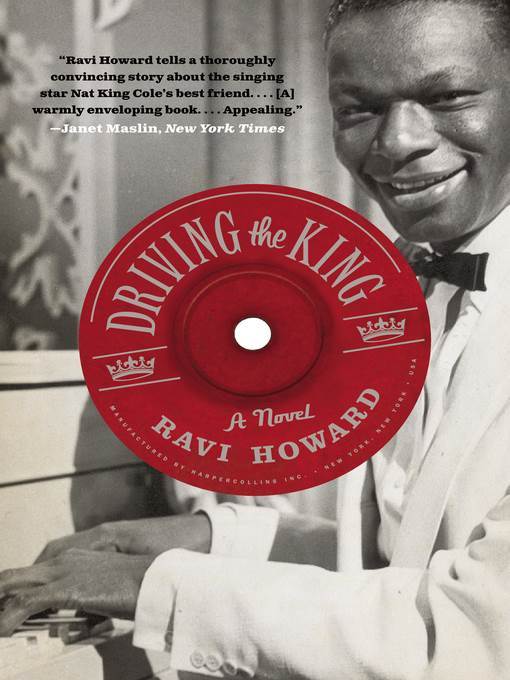
Driving the King
A Novel
کتاب های مرتبط
- اطلاعات
- نقد و بررسی
- دیدگاه کاربران
نقد و بررسی

Starred review from November 10, 2014
Howard (Like Trees, Walking) brings readers back in time to postwar Alabama, in this velvety smooth fictional memoir. The story starts on the day of a long-awaited concert in Montgomery in 1956, featuring native son Nat King Cole. The narrative returns to this day repeatedly, but the events of the novel begin a decade before. Nathaniel Weary is just back from the European front and is looking forward to a concert by Cole, his now-famous childhood friend. During Cole’s first song, though, he is attacked by a white man, and Weary literally leaps from the balcony to the singer’s defense. Cole is saved but Weary is sentenced to 10 years in prison for “inciting a riot.” Howard moves back and forth in time, describing Weary’s days at war, his recollections of his family, his time in prison, and, eventually, his years in L.A. as Cole’s driver and bodyguard. This story about a strong man, living with his head held high, is set against the backdrop of Jim Crow and the Montgomery bus boycott. Howard’s prose goes down like the top-shelf whiskey that Weary favors, making for a heady reading experience.

August 1, 2014
Winner of the Zora Neale Hurston/Richard Wright Award and the Ernest J. Gaines Award for Literary Excellence, Howard reimagines a significant incident in the life of Nat King Cole. In post-World War II Alabama, Nat Weary is jailed for defending the singer, a childhood friend, when he is attacked onstage by a white man. After Weary is freed, he becomes Cole's chauffeur in Los Angeles.
Copyright 2014 Library Journal, LLC Used with permission.

January 1, 2015
A historical novel places Nat King Cole, as seen through the eyes of an ill-starred friend, at the epicenter of mid-20th-century America's racial transformation.In April 1956, Cole, at the crest of his widespread, cross-cultural renown as a pop vocalist, was assaulted by white supremacists while performing at the Birmingham State Theater in his native Alabama. Six months later, he became the first African-American to headline his own TV variety series, just as the epochal bus boycott led by Martin Luther King Jr. was about to enter its second year. Howard, whose previous novel, Like Trees, Walking (2007), was inspired by a real-life lynching, conflates these events into a novel of reimagined history in which the attack on Cole is pushed a decade back to Montgomery just after World War II. An ex-GI and childhood friend of Cole's named Nathanial Weary thrusts himself between a pipe-wielding racist and the singer's head. Weary is charged with inciting a riot and sentenced to 10 years in prison. Upon his release, he's hired by Cole-who's never forgotten his friend's sacrifice-as his bodyguard and driver in Hollywood. Within this revisionist framework, Howard seeks to recount through Weary's voice the harsh truths of postwar Jim Crow as it comes under direct siege in the 1950s. That narrative voice-tough, shrewd, barely containing the hurt from public and private injustices-is the novel's finest attribute. And yet, readers may lose their moorings within the novel's time-shifting tactics. Not that there's anything wrong with shifting facts in fiction for the sake of larger truths; some great Western films have come from such tactics. But you're never altogether sure at the start of each chapter whether you're in the '40s or the '50s. Such uncertainty contributes to a gauzy, almost dreamlike aura that makes the characters, even the stoic Weary, elusive, almost spectral figures. This is especially frustrating with the novel's depiction of Cole, who is conceived with much charm, some quirky nervous tics and not much else. Maybe Nat King Cole will always be something of a hallowed enigma among the great American musical icons. But one would think even a delicately woven novel that dares to reconfigure historical events might have taken more risks with its characterizations.
COPYRIGHT(2015) Kirkus Reviews, ALL RIGHTS RESERVED.

November 1, 2014
Focusing on the lives of Nat King Cole and his driver, Nat Weary, Howard offers a fictionalized account of a concert in Montgomery, Alabama, that ended abruptly when a white man attacked Cole during the show. Weary, newly returned from military service during WWII and about to propose to his childhood sweetheart, interceded and saved Cole's life. Previously convicted of assault, he had served 10 long years and given up on the woman he loved and on much of life. Then Cole offers him a job. Weary joins Cole's staff in L.A. as driver and bodyguard as the singer makes his television debut. L.A. in the 1950s has its own brand of racism as Cole struggles to build a TV show with no sponsors. As Cole and Weary decide to return to Montgomery to complete their unfinished business, the two towns and their racial struggles are on full display through the limitations placed on Cole's career and the beginnings of the Montgomery bus boycott. Alternating between the cities and Weary's past and present, Howard explores race relations in the pre-civil rights era and the strong ties forged between two extraordinary men.(Reprinted with permission of Booklist, copyright 2014, American Library Association.)

























دیدگاه کاربران